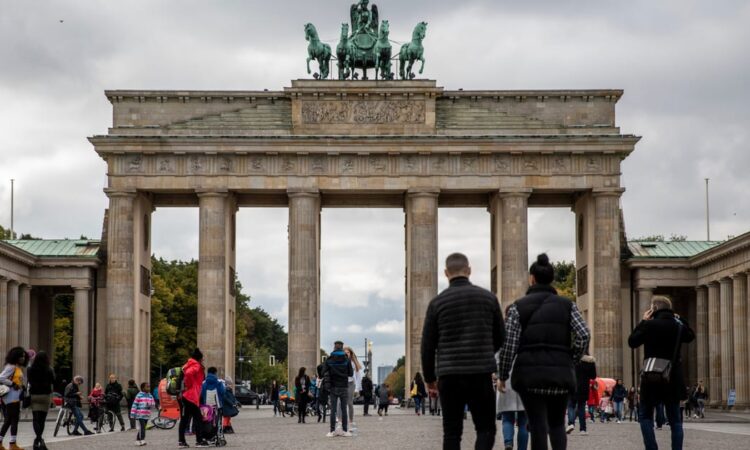
BERLIN — Europe’s largest economy has money problems for the first time in nearly a decade — and it’s up to three squabbling parties to fix them.
Germany has officially fallen into a recession, official figures showed Thursday, with economic output falling by 0.3 percent during the first quarter of the year — the second quarter in a row with a decreasing gross domestic product. The drop was largely attributed to lower consumer spending due to higher prices amid inflation of 7.2 percent.
This adds to previously existing pressure on the trio of coalition partners in Berlin’s government to cut costs. That requires tough decisions, but their approaches to the problem are vastly different: The environmentalist Greens want to invest more in things like climate protection by taxing the rich — a prospect rejected by the business-friendly Free Democrats (FDP), who want to deregulate.
Caught in the middle, Chancellor Olaf Scholz’s Social Democrats hope attracting skilled foreign labor and investing in new, green industries will create growth, though it’s not clear how.
“The prospects for the German economy are very good. We will work out the challenges we face,” Scholz said at a press conference Thursday.
But not everyone is as optimistic, with Scholz’s Vice Chancellor and Economy Minister Robert Habeck, from the Greens, warning earlier this week that Germany faces potential budget cuts of up to €22 billion next year.
“It’s the first time in many years that the federal budget is getting smaller, and … of course, the whole system is not attuned to that,” Habeck said.
Battles over how to mitigate the country’s fiscal woes will only add to mounting fights within the ruling coalition, most recently over a contentious ban on oil and gas heating in homes that has pushed Germany to the brink of a government crisis. The last time Berlin had to make such tough budget cut decisions was in 2014 after the global financial crisis, and just two political blocs were in power: the Social Democrats and Angela Merkel’s conservative CDU/CSU.
Finance Minister and FDP leader Christian Lindner cautioned this week that the government needed to prepare for “challenging” negotiations on next year’s budget, while also pushing to boost the economy by cutting red tape as well as attracting more investment and skilled workers.
Not doing so, he warned, could put Germany in “danger” of falling behind international competition.
Germany being in a recession also spells trouble for the eurozone and wider European Union, which are hugely dependent on the humming engine of the country’s vast industries.
Lindner and his FDP argue Germany has no other choice but to cut costs: He predicted a shortfall of €30 billion in tax income over the next few years as the economy suffers from the consequences of Russia’s war in Ukraine, including higher energy prices and lower investment rates. The latest news of an economic recession means the government has no reason to hope that tax income could increase again soon.
Another major problem is rising interest rates, which are eating into the remaining financial leeway: In comparison to 2021, when Germany had to pay just €3.9 billion in interest for its debt, these expenses are projected to reach €39.9 billion this year — a tenfold increase.
“For a very long time, we lived very well on artificially low interest rates,” Lindner said Thursday. “Now, in a very different economic environment and in a very different interest-rate environment, we have the task of returning to sound public finances and their long-term sustainability.”
Since forming the three-way government in 2021, Scholz has been able to resolve funding disputes by creating special funds that lie outside the regular budget, including a controversial €200 billion pot of cash to lower gas and energy prices for citizens and companies, as well as a €60 billion climate fund to help meet environmental goals. But these so-called shadow budgets have reached a hefty size, which the parties are loath to add to — hitting a whopping €360 billion last year, or 75 percent of this year’s regular budget of €476 billion (the special funds will be paid out over several years, though).
Individual ministries have also shown little willingness to cut costs. On the contrary, they’ve asked for €70 billion more in next year’s budget to accommodate a range of special requests — from more money for child support and climate protection to further funds to modernize Germany’s armed forces and fulfill NATO’s 2 percent defense spending target.
“This will be the most difficult budget in 10 years,” Dennis Rohde, the budgetary spokesperson for Scholz’s Social Democrats, told POLITICO.
His Green counterpart Sven-Christian Kindler said the government should invest more money in issues like climate protection, which should be financed “through a better, fairer tax policy that places greater responsibility on the rich.” He admitted, however, that Lindner has rejected such tax increases: “The finance minister is not a fan of these proposals,” Kindler said.
Otto Fricke, the FDP’s budgetary spokesperson, argued that the planned budget for next year would, despite the cuts, still be much higher than previous budgets before the coronavirus pandemic: The economic growth of the past few years had allowed Germany to expand its regular budget.
“With around €420 billion planned so far, next year’s spending would be €60 billion above the pre-crisis budget of 2020,” he told POLITICO. “Such an increase had previously taken 10 years.”






